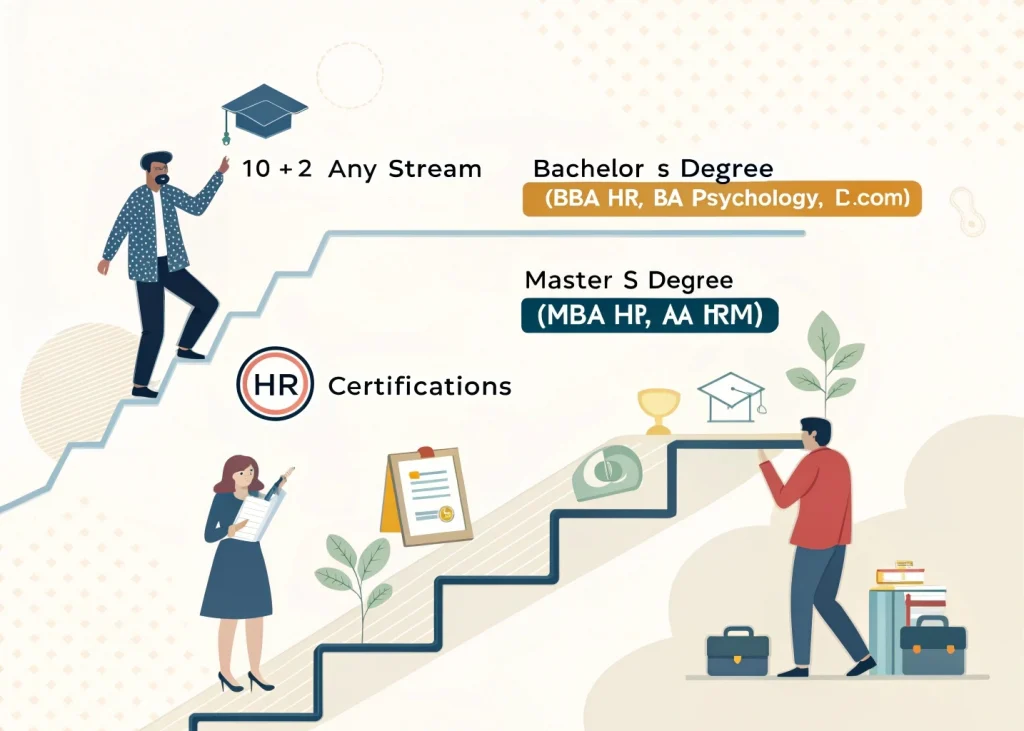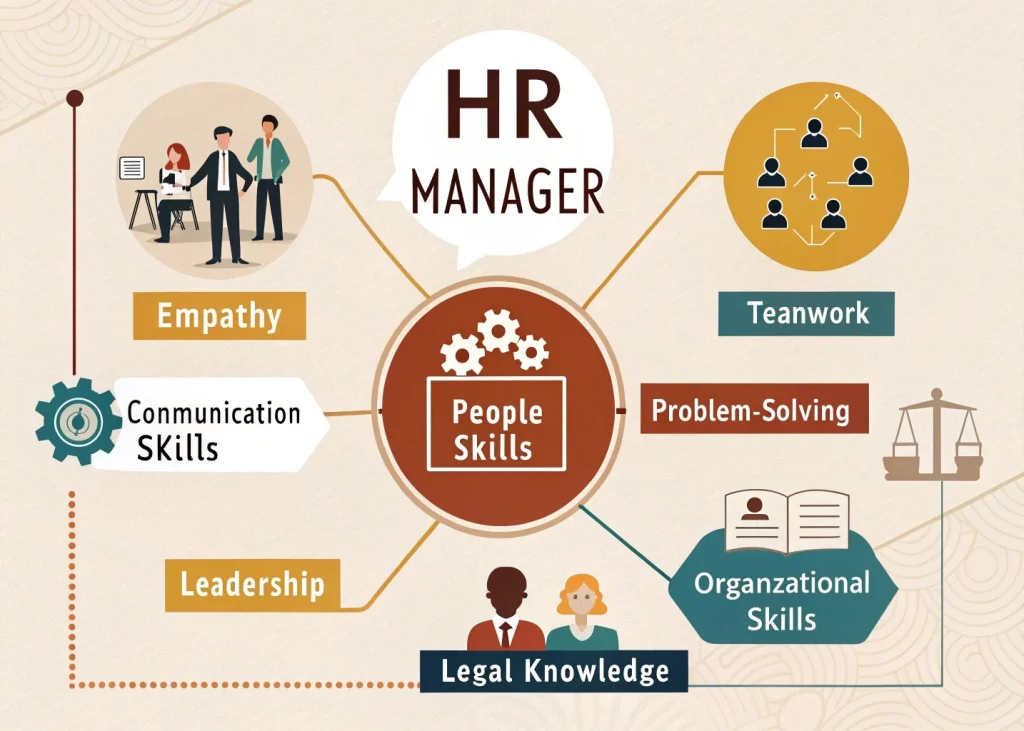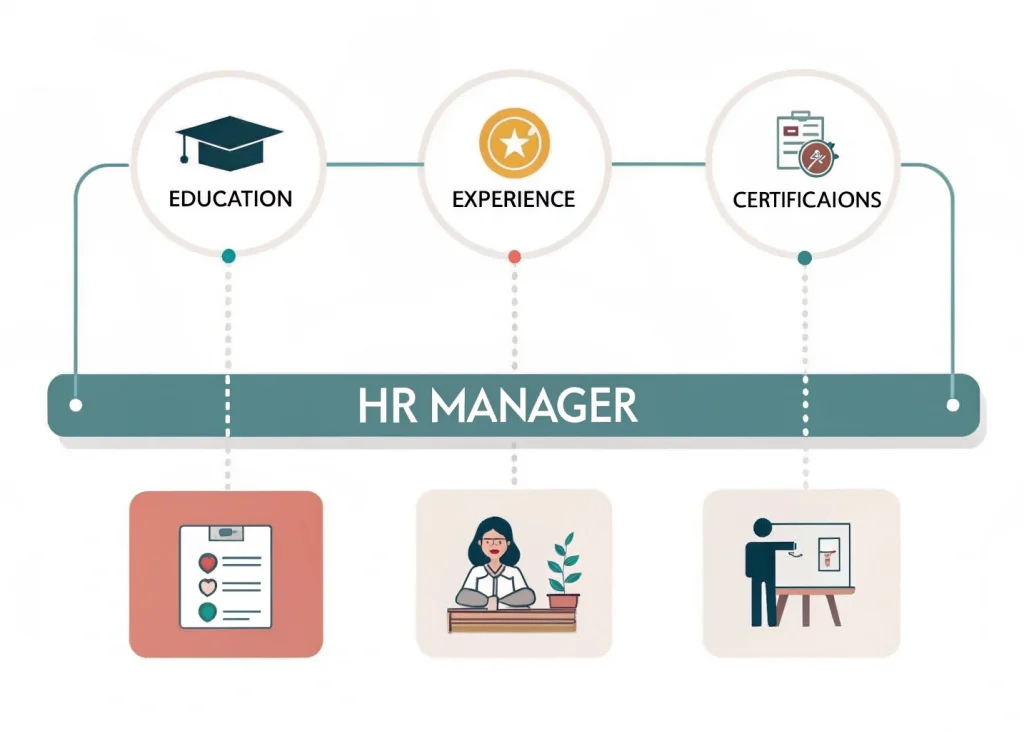An HR (Human Resource) Manager is someone who helps take care of the people working in a company. They handle important tasks like hiring new employees, helping them settle into their jobs, making sure company rules are followed, solving employee problems, and keeping everyone motivated and happy at work.
The role of an HR Manager is not just about paperwork—it’s about understanding people, solving problems, and helping the company grow by building a strong team. If you enjoy working with people and want to make a real difference in a workplace, a career in HR could be a great choice.
In this guide, you’ll learn everything you need to know about becoming an HR Manager in India—what to study, the skills you need, certifications that help, job roles, salary, and more. Let’s get started on your journey toward a successful HR career!
Educational Qualifications Required to Become an HR Manager

To become an HR Manager, you need the right education. Here’s what most people follow:
1. Complete 10+2 (Any Stream)
You can choose any stream (Arts, Commerce, or Science) in school. There is no specific subject required, but having subjects like Business Studies, Psychology, or Sociology can be helpful.
2. Get a Bachelor’s Degree
After school, you need a graduation degree. You can choose:
- BBA in Human Resource Management
- BA in Psychology or Sociology
- B.Com (Commerce students)
- Any Bachelor’s degree (you can still go into HR later with the right skills and further study)
3. Pursue a Master’s Degree (Optional but Helpful)
Many HR Managers go for a master’s degree to get better job opportunities. Popular options are:
- MBA in Human Resource Management
- MA in Human Resource Management / Industrial Relations
- PGDM (Post Graduate Diploma in Management) with HR specialization
4. Professional Certifications (Add Extra Value)
While not compulsory, doing HR certifications can boost your profile. These show that you have updated and professional HR knowledge. (We’ll cover this more in a later section.)
Tip: Focus on learning both theory and practical skills during your studies. Internships, projects, and group work can help you understand how HR works in the real world.
Important Skills and Traits of a Successful HR Manager

Being a successful HR Manager is not just about having the right degree—it’s also about having the right skills and personality. Here are some of the most important ones:
| Skill/Trait | Why It’s Important |
|---|---|
| Communication Skills | Helps in talking, listening, interviewing, and clearly explaining policies. |
| People Skills | Builds strong relationships with employees and creates a positive work environment. |
| Problem-Solving | Useful in handling conflicts, complaints, and finding fair solutions. |
| Leadership Qualities | Helps in guiding teams, leading sessions, and making confident decisions. |
| Organizational Skills | Keeps tasks, records, and responsibilities well-managed and on track. |
| Knowledge of Laws | Ensures the company follows labor laws and employee rights properly. |
| Empathy and Patience | Makes employees feel heard and supported during difficult situations. |
| Teamwork | Allows smooth collaboration with other departments and team members. |
Communication Skills
Helps in talking, listening, interviewing, and clearly explaining policies.
People Skills
Builds strong relationships with employees and creates a positive work environment.
Problem-Solving
Useful in handling conflicts, complaints, and finding fair solutions.
Leadership Qualities
Helps in guiding teams, leading sessions, and making confident decisions.
Organizational Skills
Keeps tasks, records, and responsibilities well-managed and on track.
Knowledge of Laws
Ensures the company follows labor laws and employee rights properly.
Empathy and Patience
Makes employees feel heard and supported during difficult situations.
Teamwork
Allows smooth collaboration with other departments and team members.
Step-by-Step Guide: How to Become an HR Manager

Becoming an HR Manager takes time and effort, but if you follow the right steps, you can build a strong career in human resources. Here’s a simple guide to help you:
- Complete Relevant Education
Start by finishing your 10+2 (any stream), then pursue a Bachelor’s degree in fields like:
- BBA in Human Resource Management
- BA in Psychology or Sociology
- B.Com or any other graduation
For better job opportunities, you can also go for a Master’s degree, like an MBA or PGDM in Human Resource Management.
- Gain Practical Experience (Internships/Entry-Level Jobs)
Getting real-world experience is very important. You can:
- Do internships during or after your studies
- Apply for entry-level jobs like HR assistant, recruiter, or coordinator
These roles will help you understand how HR works in companies and build confidence.
- Obtain Professional Certifications
Certifications help you learn specialized HR skills and make your resume stronger. Some popular ones include:
| Certification/Course | Offered By | What You Learn | Best For |
|---|---|---|---|
| SHRM Certified Professional (SHRM-CP) | SHRM (Society for Human Resource Management) | Covers HR operations, policies, employee engagement, and HR strategy. | Early to mid-level HR professionals |
| PHR (Professional in Human Resources) | HRCI (HR Certification Institute) | Focuses on talent planning, legal compliance, and employee & labor relations. | Professionals with some HR experience |
| LinkedIn Learning / Coursera HR Courses | Online Platforms | Short, practical courses on hiring, payroll, performance, HR analytics, etc. | Beginners or skill-specific learners |
SHRM Certified Professional (SHRM-CP)
Offered By: SHRM (Society for Human Resource Management)
What You Learn: HR operations, policies, employee engagement, HR strategy
Best For: Early to mid-level HR professionals
PHR (Professional in Human Resources)
Offered By: HRCI (HR Certification Institute)
What You Learn: Talent planning, legal compliance, labor relations
Best For: Professionals with some HR experience
LinkedIn Learning / Coursera HR Courses
Offered By: Online Platforms
What You Learn: Practical skills in hiring, payroll, performance, HR analytics
Best For: Beginners or skill-specific learners
Even short online courses can be helpful if you’re just starting out.
4. Develop Soft Skills and Leadership Qualities
Along with education and experience, soft skills are very important in HR. Focus on:
- Good communication and teamwork
- Leadership and problem-solving
- Patience and empathy for dealing with employees
You can improve these by participating in group activities, volunteering, or taking workshops.
By following these steps one by one, you’ll be well-prepared to build a successful career as an HR Manager.
Popular Certifications for HR Managers
While a degree gives you a strong foundation, HR certifications help you gain specialized knowledge and improve your chances of getting hired or promoted. These certifications show that you are serious about your career and updated with the latest HR practices.
Here are some popular certifications for HR professionals:
| Certification/Course | Ideal For | What It Covers | Recognition / Platform |
|---|---|---|---|
| SHRM-CP (Certified Professional) | Early to mid-level HR professionals | Employee engagement, workplace policies, talent management | Recognized globally (offered by SHRM) |
| PHR (Professional in Human Resources) | Professionals with some HR experience | HR operations, business management, labor laws | International (offered by HRCI) |
| CHRP (Certified Human Resources Professional) | Beginners and professionals in Canada | Recruitment, health & safety, employee training | Offered in Canada and a few other countries |
| HR Analytics Certification | HR professionals interested in data skills | Data-driven HR decisions, reporting, analytics tools | Available on Coursera, Udemy, etc. |
| LinkedIn Learning / Coursera / Udemy HR Courses | Beginners or skill-specific learners | Short courses on recruitment, payroll, performance management, and other HR basics | Online, flexible, and affordable |
SHRM-CP (Certified Professional)
Ideal For: Early to mid-level HR professionals
What It Covers: Employee engagement, workplace policies, talent management
Recognition / Platform: Recognized globally (offered by SHRM)
PHR (Professional in Human Resources)
Ideal For: Professionals with some HR experience
What It Covers: HR operations, business management, labor laws
Recognition / Platform: International (offered by HRCI)
CHRP (Certified Human Resources Professional)
Ideal For: Beginners and professionals in Canada
What It Covers: Recruitment, health & safety, employee training
Recognition / Platform: Offered in Canada and a few other countries
HR Analytics Certification
Ideal For: HR professionals interested in data skills
What It Covers: Data-driven HR decisions, reporting, analytics tools
Recognition / Platform: Available on Coursera, Udemy, etc.
LinkedIn Learning / Coursera / Udemy HR Courses
Ideal For: Beginners or skill-specific learners
What It Covers: Short courses on recruitment, payroll, performance management, and other HR basics
Recognition / Platform: Online, flexible, and affordable
Tip: You don’t need all these certifications—choose one based on your career stage and interest. Even one good certification can boost your profile and make you stand out to employers.
Explore our online programs to become future-ready
Transform your career with industry-aligned courses designed by experts.
Career Path and Growth Opportunities in HR Management
A career in HR management can be both rewarding and full of opportunities. As you gain more experience and skills, you can grow into higher positions with better pay and responsibilities.
Here’s how the career path usually looks:
| Role | Description |
|---|---|
| HR Intern | Entry-level role during or just after graduation. Learn basics like recruitment and employee records. |
| HR Assistant / HR Executive | First full-time role. Manages tasks like interview scheduling, onboarding, and record-keeping. |
| HR Generalist / HR Officer | Handles various HR functions like hiring, payroll, training, and employee support. Builds broad skills. |
| HR Manager | Leads an HR team or department. Makes key decisions on hiring, policies, and performance reviews. |
| Senior HR Manager / HR Business Partner | Works with leadership on strategy, employee engagement, and planning HR programs. |
| HR Director / Head of HR | Senior-most HR role in a department. Sets HR goals, manages budgets, and shapes policies. |
| Chief Human Resources Officer (CHRO) | Executive-level role. Guides the overall people strategy at the highest level in the company. |
HR Intern
Entry-level role during or just after graduation. Learn basics like recruitment and employee records.
HR Assistant / HR Executive
First full-time role. Manages tasks like interview scheduling, onboarding, and record-keeping.
HR Generalist / HR Officer
Handles various HR functions like hiring, payroll, training, and employee support. Builds broad skills.
HR Manager
Leads an HR team or department. Makes key decisions on hiring, policies, and performance reviews.
Senior HR Manager / HR Business Partner
Works with leadership on strategy, employee engagement, and planning HR programs.
HR Director / Head of HR
Senior-most HR role in a department. Sets HR goals, manages budgets, and shapes policies.
Chief Human Resources Officer (CHRO)
Executive-level role. Guides the overall people strategy at the highest level in the company.
Growth Opportunities
- Specialize in fields like Recruitment, Training & Development, Payroll, HR Analytics, or Employee Relations
- Work in different industries such as IT, education, healthcare, manufacturing, and more
- Switch to international HR roles with global certifications
Tip: Keep learning and improving your soft skills, technical knowledge, and certifications to keep growing in your HR career.
Challenges Faced by HR Managers and How to Overcome Them
Being an HR Manager is a rewarding job, but it also comes with some challenges. Handling people, solving problems, and keeping the workplace running smoothly can sometimes be tough. Here are some common challenges and how to deal with them:
- Managing Conflicts Between Employees
Challenge: Disagreements or misunderstandings between employees can affect team spirit.
Solution: Stay calm, listen to both sides, and try to find a fair solution. Being neutral and respectful helps build trust.
- Keeping Employees Motivated
Challenge: Employees may feel bored, stressed, or unhappy at work.
Solution: Arrange fun activities, give recognition for good work, and ask for feedback to understand their needs.
- Handling a High Workload
Challenge: HR Managers often deal with many tasks at once, like hiring, payroll, and solving issues.
Solution: Use planning tools, set priorities, and delegate work when possible. Time management is key.
- Staying Updated with Labor Laws
Challenge: Laws and company policies keep changing, and not following them can cause problems.
Solution: Regularly read HR updates, attend workshops, or take online courses to stay informed.
- Maintaining Employee Privacy
Challenge: HR deals with personal and sensitive information.
Solution: Always keep employee data safe and share it only when truly necessary. Trust and confidentiality are very important.
- Managing Remote or Hybrid Teams
Challenge: It’s harder to connect with and support employees who work from home.
Solution: Stay in touch through regular virtual meetings, and create online feedback or support channels.
Tip: HR Managers should always be patient, open to learning, and ready to adapt to change. That’s how you grow and succeed in this role.
Average Salary of an HR Manager in India
The salary of an HR Manager in India can vary depending on experience, company size, location, and industry. In general, HR Managers are well-paid, especially as they gain more experience and skills.
1.Entry-Level HR Manager (0–2 years of experience):
₹3,00,000 to ₹5,00,000 per year
2. Mid-Level HR Manager (3–7 years of experience):
₹6,00,000 to ₹10,00,000 per year
3. Senior HR Manager (8+ years of experience):
₹10,00,000 to ₹18,00,000+ per year
Salary Also Depends On:
- Location: HR Managers in big cities like Mumbai, Delhi, or Bangalore may earn more.
- Company Size: Larger companies often pay higher salaries than startups or small firms.
- Skills & Certifications: Extra skills in areas like HR analytics, labor law, or leadership can increase your salary.
Tip: Keep learning and gaining experience. The more skilled and experienced you are, the better your earning potential will be in HR.
Tips to Excel as an HR Manager
To become a great HR Manager, it’s not just about doing your job—it’s about doing it well, building trust, and constantly improving. Here are some simple but powerful tips to help you shine in your HR career:
| Tip | Why It’s Important |
|---|---|
| Keep Learning | Helps you stay updated with new HR trends, laws, and tools. |
| Communicate Clearly | Avoids confusion and builds strong relationships with employees and teams. |
| Be a Good Listener | Builds trust and shows employees that their concerns matter. |
| Stay Organized | Helps you manage multiple tasks, documents, and schedules efficiently. |
| Show Empathy | Creates a supportive and respectful work environment. |
| Use Technology | Saves time and improves accuracy in tasks like payroll and recruitment. |
| Be Professional and Fair | Builds trust and ensures everyone is treated equally and respectfully. |
| Focus on Team Building | Encourages teamwork, improves employee engagement, and boosts morale. |
Keep Learning
Helps you stay updated with new HR trends, laws, and tools.
Communicate Clearly
Avoids confusion and builds strong relationships with employees and teams.
Be a Good Listener
Builds trust and shows employees that their concerns matter.
Stay Organized
Helps you manage multiple tasks, documents, and schedules efficiently.
Show Empathy
Creates a supportive and respectful work environment.
Use Technology
Saves time and improves accuracy in tasks like payroll and recruitment.
Be Professional and Fair
Builds trust and ensures everyone is treated equally and respectfully.
Focus on Team Building
Encourages teamwork, improves employee engagement, and boosts morale.
Tip: A great HR Manager is someone who understands people, stays organized, and keeps learning. Practice these tips daily and you’ll keep growing in your career.
Conclusion
Becoming an HR Manager is a step-by-step journey that starts with the right education and grows through experience, skills, and constant learning. If you enjoy working with people, solving problems, and building a positive work environment, then HR can be a highly rewarding career for you.
From internships to senior-level roles, the HR field offers many growth opportunities. By focusing on both professional knowledge and people skills, you can make a real difference in any organization. Keep learning, stay updated, and always lead with empathy and fairness—and you’ll be well on your way to becoming a successful HR Manager.


Leave a Reply